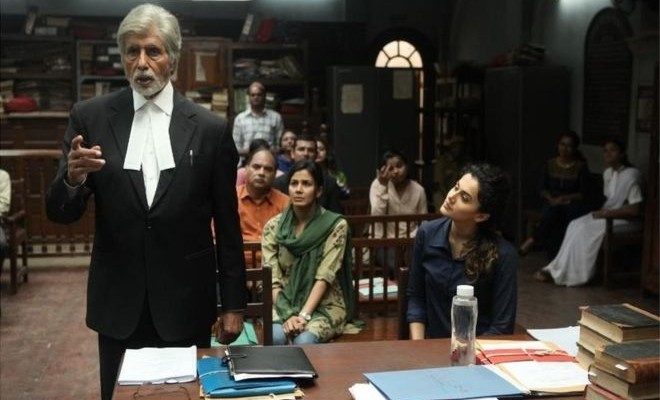Last year, a 32-year-old Indian security guard in Australia accused of stalking two women was let off by a court after he argued that Bollywood films had led him to believe that it was “quite normal behaviour” for Indian men to obsessively target women.
He was being perversely honest. In Bollywood movies, the hero will often pursue the heroine with a vengeance. He will stare at her, wolf-whistle and stalk her relentlessly. Spurned lovers will chase and harass women. A critic once wrote that the Bollywood stalker had evolved from a “nominal villain to an outright hero”.
Now a new Bollywood film, Pink, challenges many of the industry’s cringe-worthy, misogynistic tropes including stalking and rape threats as romantic moves.
The film, directed by Aniruddha Roy Chowdhury, revolves around three young women who are flatmates in the capital, Delhi, which is also one of India’s most unsafe cities for women.
‘Teach her a lesson’
While Minal (played by Taapsee Pannu) is from Delhi, her mates are Falak, a Muslim from Lucknow, and Andrea, who is from to Meghalaya in the north-east of India.
The three attend a rock concert in the outskirts of the capital and hang out with a male friend, who brings along his friends. An offer to drinks and dinner turns sour when Minal is molested.
In a bid to protect herself, Minal swings a beer bottle at her molester, leaving him grievously injured.
Why India gang-rape film row is extraordinary
How India treats its women
Has India reached a turning point in tackling rape?
Explaining India’s news anti-rape laws
The women flee the scene and try to put the unpleasantness behind them and get on with their lives.
However the three men, who have political connections in the capital, begin to stalk and terrorise the girls. One of the men says, “It will be fun to teach her a lesson”.
The film is then played out as a courtroom drama that shows how Indian women often keep away from reaching out to police or the courts for help, fearing the shame they could be further subjected to.
The three women are shown breaking down repeatedly in court when subjected to the prosecutor’s sexist line of questioning.
Pyrrhic victory
Pink ends on a note of pyrrhic victory for the girls, but the patriarchal menace that threatens Indian women from leading their independent lives lingers to its end.
Bollywood superstar Amitabh Bachchan plays the defence attorney who seeks justice for the wronged girls. He’s the elder patriarch who rebukes the moral hypocrisy and ineptitude in India regarding women.
“A woman’s no means no, be it a sex worker, a casual acquaintance or even a wife,” Bachchan tells the court. This dialogue has been repeated on social media threads, with many women endorsing it.
The three female leads in Pink don’t dance, sing or play coy around the heroes like the characters in most Bollywood movies.
They are threatened with the terror of assault. They are bullied for the crime of not consenting and being unapologetic about saying no to sexual advances, a situation that is all too familiar for many women in Indian cities.
The women are angry and indignant at the hurt caused by a ruthless patriarchal system.
They stand up and fight a cult of masculinity that keeps women repressed and wants to “teach a lesson” to women who dare to stand up for themselves.
Pink has won rave reviews from Indian critics and is having a successful run at the box office.
‘Response to atrocities’
The Times of India said “Pink is a powerful statement on the existing feudal mindset of a majority of India”. And The Guardian called it “a naturalistic drama that forms a serious attempt to grapple with India’s rape culture”.
Script writer Ritesh Shah says Pink “has become much more than a film”.
The film has opened a much-needed debate about female consent, patriarchy and respect for women in India.
“My film is a response to all the atrocities and moral policing that we read about in India almost daily,” director Aniruddha Roy Chowdhury told the BBC.
“Pink is a protest call to not judge women. A woman who drinks, parties and has male friends over to her house is branded as a ‘woman of low character’. A democratic society must be intolerant to a culture that brands women like this.”


Leave a Reply